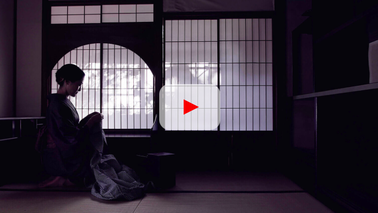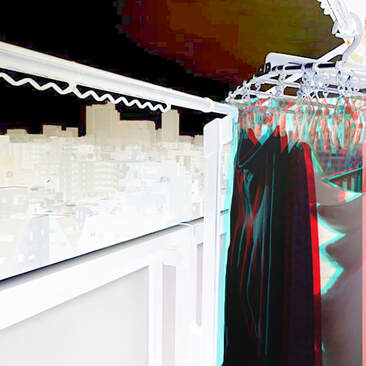The Knock on the Wall
by Reed Venrick
by Reed Venrick
|
ONE
Imagine renting a flat in Tokyo, just An ordinary building on the third floor, Long and narrow in design, a kind Known as a railroad car, where Walking in from the landing, you unlock The door, step into the petite entrance, Leave your shoes, of course. With two Steps more, you enter the kitchen, just A meter and half wide. There you look Over the dining area, containing only A “kotatsu” table standing low against The left wall, where crushed cushions Rest on the floor for you and guests. To the right, a tiny bathroom, just Wide enough for a sink and toilet, And a square tub only big enough For one to bathe or shower. You step Further into the railroad car: a sliding “Shoji” paper door allows you to enter Your “tatami” sleeping room, a raised Floor made of smooth, woven reeds. Three steps across the tatami And you slide open the glass door To a balcony not larger than The space of a caboose, and Standing there, you look across The blue-tied roofs of suburban Shinjuku—you gaze up and over The skyscrapers of downtown. On clear days and sometimes Waxing moon nights, you can see Across the 105 kilometers to The snow crown of Mt. Fuji. You Look around: a cozy, petite flat, Just a 5 minute walk to the local Train, then a 5 minute ride onto Your much-traveled Yamanote Loop train that circles downtown And makes all Tokyo accessible. |
TWO
But imagine: the second night in Your new flat. You have just fallen asleep—jarred awake by the noise Of water gushing from your bathroom. You leap from the sheets, fearing The water pipe in the tub has broken, You run into the bathroom, you flick On the ceiling light, then realize The running water is coming From the other side of the wall-- Someone is drawing a bath. You Tap lightly on the wall to check the Wall—must be made of material Hardly thicker than paper board. Your first Sunday morning there, You lean on your balcony railing, Sipping your Kona coffee, you see That this petite balcony is barely Big enough to stretch out your Legs; still you are glad to rent This “pied a Terre,” but as you Look back around, you realize This small flat was originally Double this size, but at some point, Partitioned into equal halves. Now you understand why the width Is so narrow, excepting the tatami Room, you can stand most places-- Stretch your arms and touch both Walls with your fingers. But you Think: ah, no problem, You are Single again. Half a railroad Car is all the space a bachelor Needs, because the grand city Of Tokyo contains plenty of room To roam ‘round ,as you daily wheel Your “mamasan” bicycle about The streets of Takadanobaba, and Grocery stores in Ikebukuro, and Catch trains nearby, when you Go to your university classes. You hear the phone ringing from Your kotatsu table, and you hurry To get it, but when you hear a female Voice answer “moshi moshi,” you Laugh to realize that again you Were fooled—standing by The thin wall, you hear a melodic Voice of a woman speaking in “Nihongo,” and you think: this is Uncanny. Her voice is so close, So clear, she could be speaking Inside your own flat. Later, that Afternoon, you again hear water Being drawn from the tub, but this Time you hear the slapping and Flapping of wet clothes, and A while later later, as you are Reading Tanizaki’s “In Praise of Shadows,” you sit up in your tatami Room. Suddenly you hear footsteps On the balcony, and as you step Over, you see female clothes Hung out on a spiderweb clothesline. And in the early evening, the delicious Scent of someone cooking ginger Chicken wafts through your flat, and When someone clinks the dishes, When someone vacuums the floor, When someone watches Japanese Tv, and when someone takes another Bath, its not too much to imagine That the two of you are flatmates. |
|
THREE
People in Tokyo work long hours, Often not returning home until 10 p.m., depending on trains. You, as well, in addition to your Day job, work some evenings, Tutoring English to executives In corporate offices. Imagine One Tuesday night, you arrive At your building to see the back Of a slim woman with long hair; She wears a formal blue suit with skirt, With long hair, walking up the stairs In front of you, and as you come Onto your third floor landing, you See her unlocking the door, just Two meters away from your own, But her back is turned, and you Cannot see her face. When you say “konban wa,”: she Repeats the greeting, but she Turns only partially, as she politely Nods, but her dark hair hangs so Long, her face is hidden, and as She opens her door, all you see Are elegant fingers, polished nails. —Watashi no namae—you begin. —No Eng-lish, no Eng-lish—she says, Waving a nervous, minimal hand, Then swift as a dancer, she enters Her flat, closes the door, but opens It again so that you see one lovely, Long-lashed eye behind the door slit. —Gomen Nasai, she says, then Not waiting for an answer, she Shuts the door, clicks the lock. Then, imagine a few evenings later, A Friday night, you come home About 9:30, feeling tired after A long work day and a corporate Tutoring job you have in Shibuya, And as you are undressing in the tatami Room you hear a gentle knocking On the wall. You hesitate. Was she Knocking for you? Or just slapping A mosquito? What the hell, you think And knock back. With an increasing Heart beat, you wait until you hear her Footsteps crossing her room and again A knock-on-the-wall. You smile and Shake your head, and knock once again. How strange yet how charming. Two People living separately but existing So closely that if there were no wall, You could reach and touch her arm. |
FOUR
So a habit begins that autumn night. When you came home you knew Within minutes if she were at home. But usually she arrived later, around 10 p.m., so you would wait until she Entered her tatami bedroom, and then You would knock twice, and she would Respond in kind. Similarly, when she Arrived home before, she would knock First on the wall. Once your knocking becomes a ritual, You think it will be inevitable that You would meet. You compose a note In your feeble Japanese, which says To the effect: “Do you catch the local Train at “Shimo-Ochiai” Station? You know the Mikan Kissaten” there? Care To meet on the weekend for coffee? Say 3 or 4 pm?” You rewrite the note to Get the syntax better, according to The Japanese course you took at Sophia University over in Ichigaya. But as you are slipping the note Into an envelope, you hear voices From her side. One voice was hers, And one, a man’s, who clearly did not Know how thin the wall was—he Spoke so loudly in Japanese that he Might have been talking in your kitchen. You stare at the written note and shake Your head. You go to the kitchen and Prepare your evening meal—soba pasta, A tub of tofu and a can of tuna, then You spend the evening, sitting back On your tatami wall, doing exercises In the book “Japanese for Busy People.” But you find it difficult to study, for all You hear for two hours is the exchange Of a Loud male and a quiet female voice Next door. You feel angst of knowing They are intimate—further chagrined To be woken when he exits the door at 12: 17. You grab up the note from the kotatsu, the One you’d written in your labored “Nihongo,” And throw it in the trash, and in the days And weeks that follow, you no longer Knock on the wall, and neither does she. |
|
FIVE
The partition that divides the balcony The two of you share is no more than A few plastic boards wired together. If you had a bucket to stand on, you Could jump over with just a hop. Since Neither of you have washing machines, She hangs out her clothes to dry. The dividing boards are high enough That from where you sit in your tatami Room, you can see her bare feet and Toned calves. You notice her “yukata” Changes from a summer green to a Crimson autumn color. But Imagine That one Wednesday morning, a storm Blows through Tokyo. You arrive home And find her clothes and intimates And the clothes-line strewn on your Balcony side. You debate what to do. You put them into a plastic bag and Hang them on her side. But you write Another note in your roman-lettered Japanese—tape it to the bag. You expect a note in return, but all You get back that night was an Extended-four-knocks. That evening Was cold, almost freezing, You lay Under your futon with the winter Moonlight lighting up your room and You ponder: how is it that a woman Of her good looks is living alone And not married at 30 years? More Or less, your own age. You remind yourself of the pattern. Apparently the same man visits her Every two weeks, usually on Fridays. Always he arrives late, and soon you Hear him engaging in loud talk and Even louder sex, then he leaves Around midnight, but he never spends The night, so you ask: is she “a second Woman?” The next time he leaves, You check your front door’s eyehole, And see a man with diamond earrings, Dark, curled hair, and as you watch, He rolls down his sleeves over full Tattoos on both arms—so you know. |
SIX
Imagine how, you, a divorced man, Living alone, can become obsessed With a woman you are virtually Co-habiting with. You soon know Her daily habits, almost as well as You know your own, yet you still Don’t know her name, so one day, You check her letters in her open Mailbox and copy down the writing You see on her electric bill, a mix Of “hiragana” and “kanji.” You then Show the writing to a colleague At work. “Her name is Ogawa,” He says. “No,” I say, “just her first Name,” He grins, “Komako, but Why do you ask? Who is she?” Months pass with few changes. But imagine that one Friday Evening During “hanami,” those blossoming Weeks in April, you realize that You have not heard a man inside her Flat for several weeks. Had they Broken up? At that time, you are Studying calligraphy in Roppongi At the International House, so you Write a note, using brush and ink On fine parchment paper: “Genki desu Ka! Do you drink tea or Coffee? Sometimes I go to the “Kissaten” Near the 7-Eleven in Takadanobaba. Care to stop by on Saturday or Sunday afternoon?” You take a deep Breath and slip it under her door. But the only response you get that Evening, when she returns, is a feeble Tap on your tatami wall. So you pass Another night hearing her every Movement: when she goes to bed, When she goes to the bathroom, When she rises in the morning, when She slides open her balcony door, When she locks her front door and Goes to work, when she returns, When she speaks on the phone. And you imagine: how simple to just Remove the boards that separate The balcony—the two of you then Could sit together on the shared space And watch the moon fly over Mt Fuji. |
|
SEVEN
Warm days of summer arrive, but you are reading Kawabata’s “Snow Country.” Easy to imagine that You and Komako are living together In Niigata, Akita, or in Aomori, where On snowy weekends you ski Trails with the “Friends of the Earth” And soak in hot springs afterwards. And yes, you imagine you are hiding out From the infamous “Yakuza,” who throw A net over Japan to seize you, but you Imagine that you are the newest James Bond, so you smack the bad guys down The nearest stairs, then you and Komako hike up through the foothills Of Mt. Fuji and sojourn long winter nights Above the timber line in a peasant’s hut, Where the rice cooking is tastily done In a cast-iron pot hanging from a rusty Chain over a hearth, but alas, the bliss Does not last. One overcast day the yakuza Find you and the razor-sharp swords Slash down the shoji doors. You, and The love of your life, Komako, leap Through the paper window and ski down The snow-covered Mt. Fuji, later flagging Down a bullet train “Shinkansen” to zip Over to the Izu Peninsula, where with Help of Komako’s uncle, a “wasabi” Farmer—neighbor to a sea captain Of a trans-Pacific freighter—and he Allows you to stowaway to Los Angeles. You continue your academic career, Teaching in a community college, but You miss your life in Japan, and there In Long Beach, you never find a place That has the charm and uniqueness Of that little railroad flat in Shinjuku. So a dream begins that often repeats: |
EIGHT
One Friday evening, you walk up The stairs to the third-floor landing. Again you enter your tiny kitchen, Of the old railroad flat, you peer Down the long length of the rooms To see Hokusai’s woodcut of “Boy Viewing Mt Fuji” facing you there on the balcony much like Rene Magritte’s “The Human Condition.” Now your dream grows more
Surreal, even incomprehensible, As dreams will. Your Japanese wife, Komako, has arrived home earlier Than you, and, as you remove Your shoes, next to hers, you Hear her drawing you a bath, just As she usually does. But when You call out the familiar “tadaima,” She does not answer. You are Alarmed—you hurry into the bath. But, as you enter, you hear the knock on the wall, and you know all is well. |



